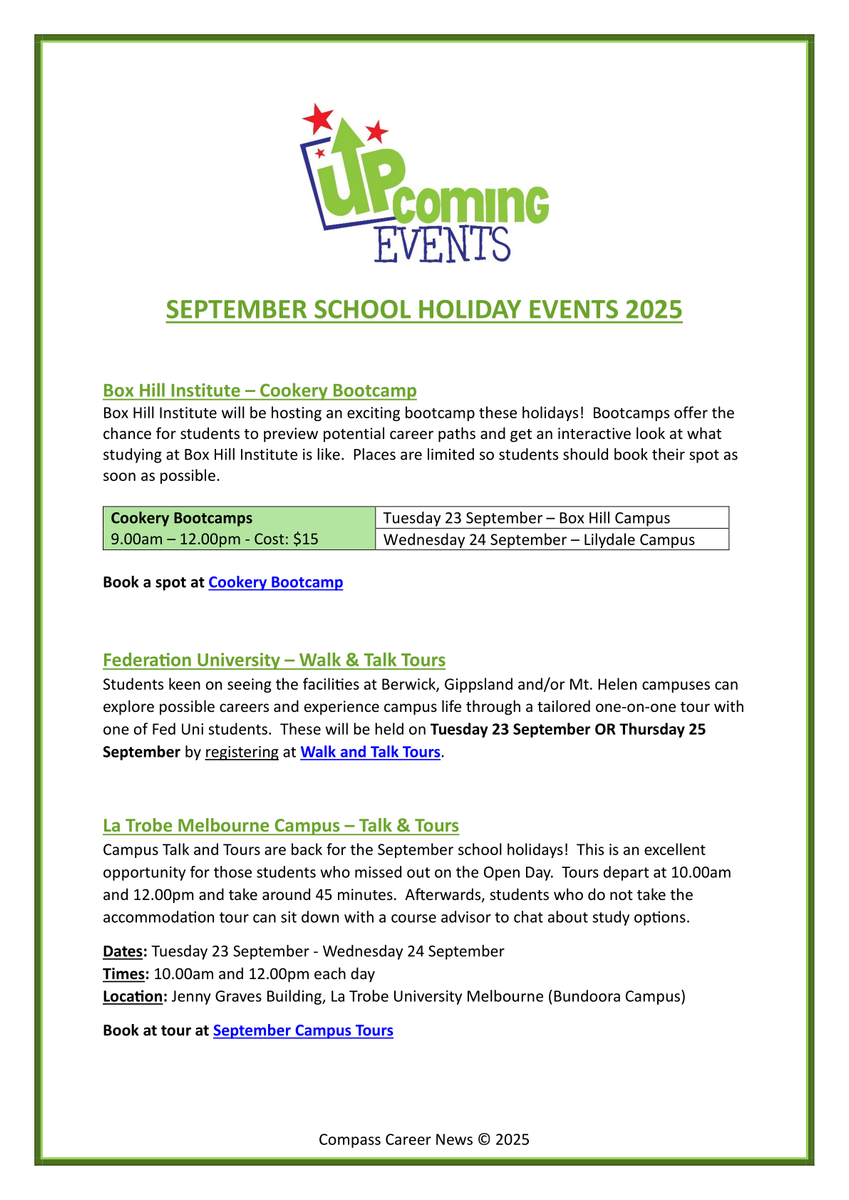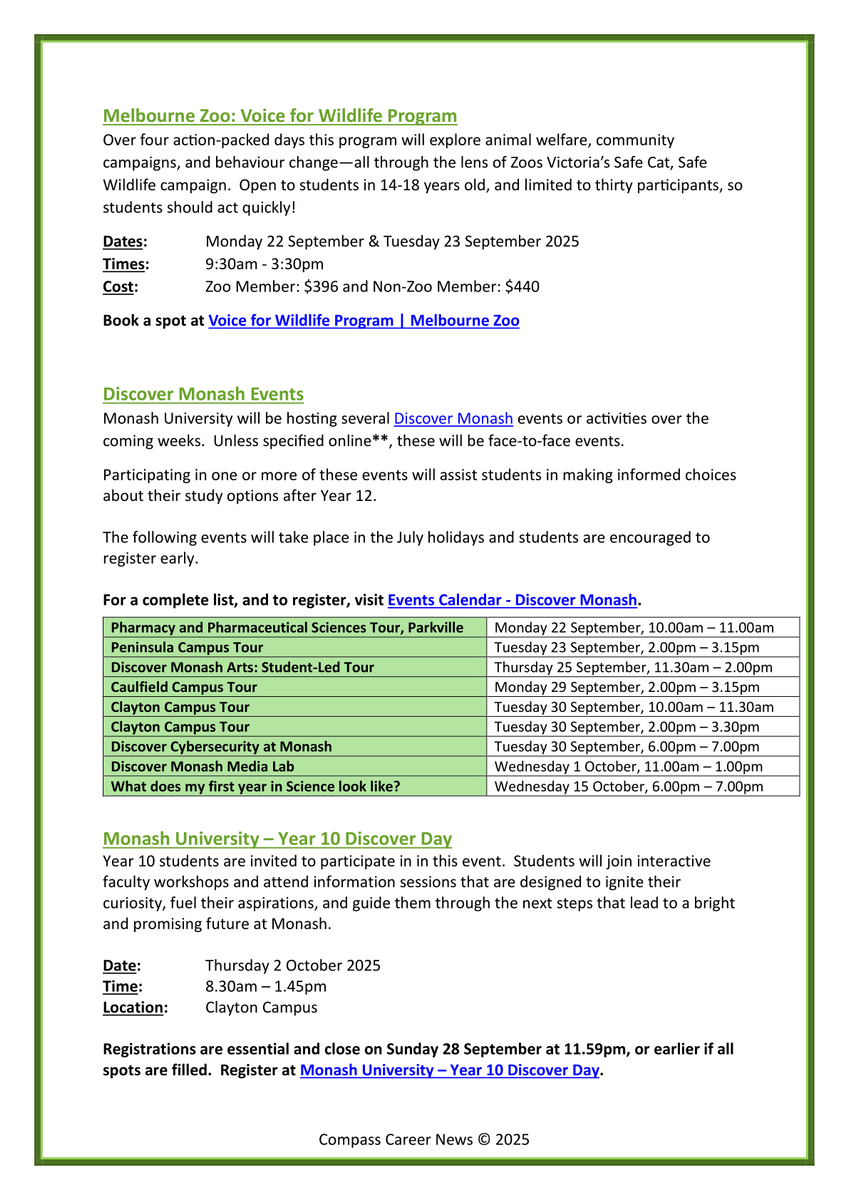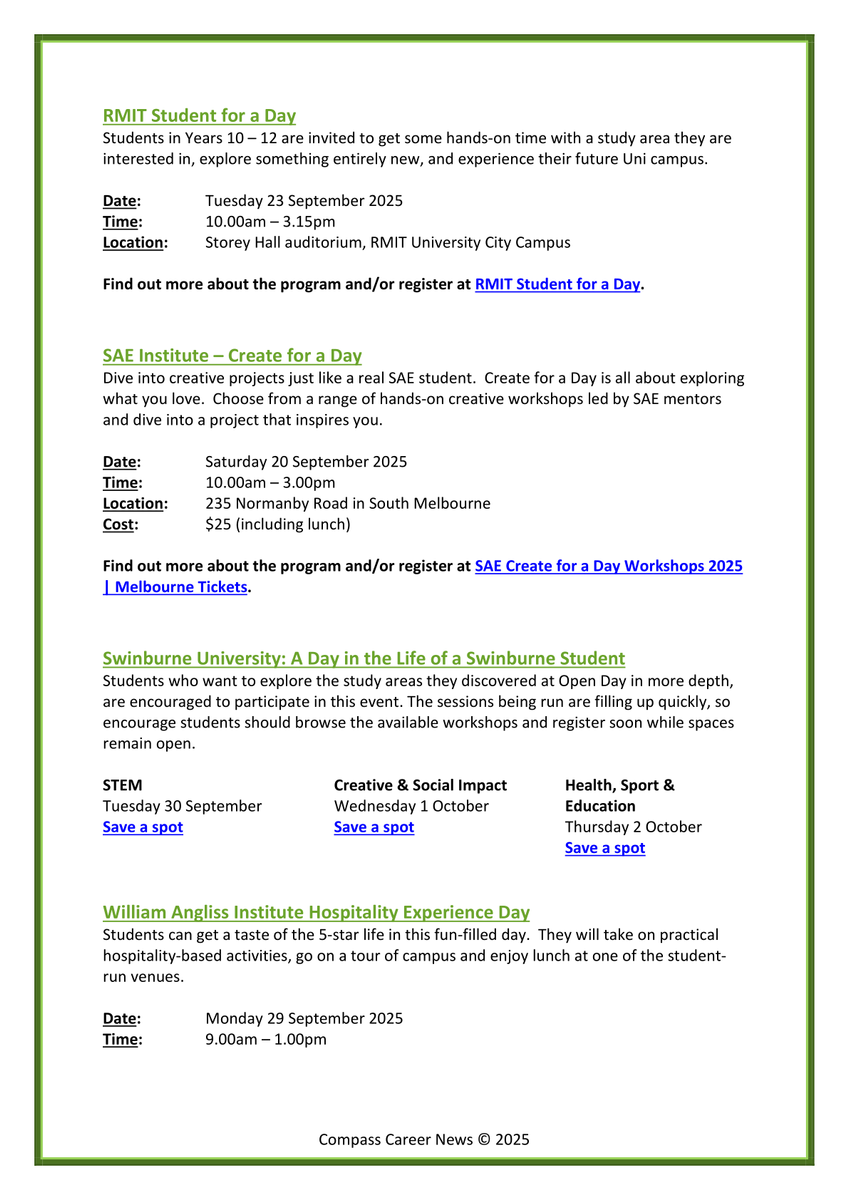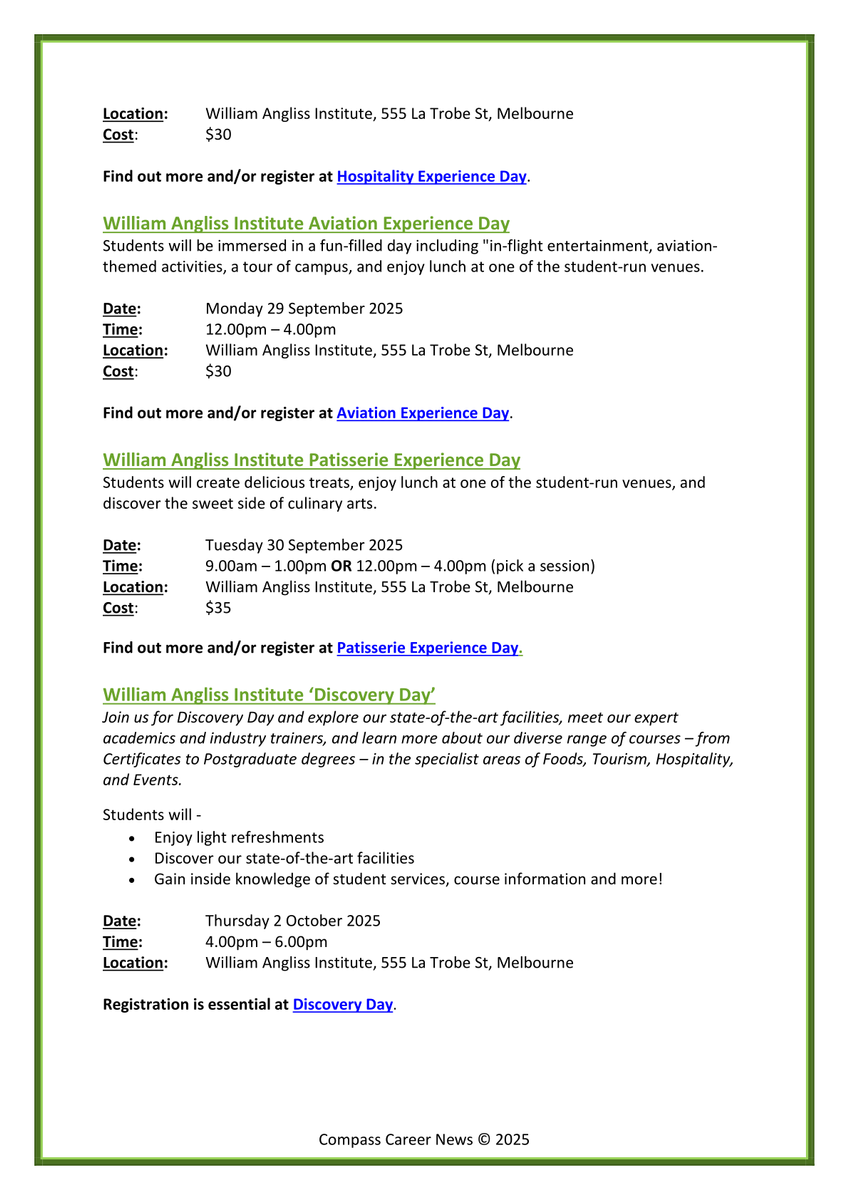Careers

Updated September School Holiday Course and Career Events
Please click here to view the updated events. Please be sure to register for your events of interest.
ACAP University College Strategies to Survive Your End-of-Year Exams – Online Session for Year 12 Students
Organisation: ACAP University College
Location: Online
Date: September 15, 2025
Calm and Conquer is your virtual toolkit for navigating the challenges of Year 12 exams with confidence and composure. Led by Alessandro Digiacomo – who brings his unique perspective as a former secondary teacher, current school counsellor and ACAP academic – these tailored sessions deliver evidence-based strategies that work in the real world.
- Understanding stress: Uncover how stress affects us physically and mentally.
- Practical tips to manage stress: Simple methods you can use right away to reduce anxiety and improve focus when studying gets intense.
- Effective study techniques: Learn how to maximise what you remember without burning out.
- Exam-day prep & reset: Strategies to manage nerves and perform at your best when it really counts.
A day in the life of a medical imaging student
Organisation: Deakin University
Location: Deakin Geelong Waurn Ponds Campus
Date: October 28, 2025
'A day in the life of a medical imaging student' is an opportunity for Year 11 students who live in the South West and Grampians/Wimmera regions and have an interest in medical imaging to experience what it is like to study at Deakin.
The day will include hands-on practical activities as well as the chance to learn more about pathways, entry requirements and career options.
Academics and current students will be available to answer all your questions.
Expressions of interest due 19 September.
10 things every entrepreneur should know
Ever watched Dragons' Den and thought, "I could do that!" or had a brilliant idea whilst lying in bed at 2am? You're not alone. Entrepreneurship is like a thrilling roller coaster – terrifying and exhilarating all at once. But before you quit school to become the next Mark Zuckerberg, here are 10 things every entrepreneur should know (according the people who have been there themselves already).
Start with a problem, not just an idea
Every great businesses solve real problems or fill voids. Your mate struggling to find decent study spaces during exam season might seem like a minor annoyance, but if students across your city share that frustration, you could be looking at a real business opportunity.
Before you fall in love with your idea, ask yourself: "What problem does this actually solve?" The most successful entrepreneurs are problem-solvers first, idea-generators second.
You don't need to be the smartest person in the room
Contrary to popular belief, you don't need to be a genius to succeed in business. What you do need is curiosity, persistence, and the wisdom to surround yourself with people who know things you don't (as well as the ability to take their advice when it's offered).
Think of yourself as the conductor of an orchestra – you don't need to play every instrument perfectly, but you need to bring out the best in everyone else.
Failure is your friend (kind of)
Every entrepreneur fails. The difference between successful ones and the rest? They see that they're failing quickly, learn from their experiences, and move on. Failure isn't the opposite of success – it's a stepping stone towards it.
If your first attempt at selling homemade candles doesn't work out, don't bin the whole idea. Ask yourself what you learned, how to improve you product, branding, market placement, budgeting etc, and importantly - how you can do it better next time.
Money management is everything
You might have the best product in the world, but if you can't manage money, your business won't survive. This doesn't mean you need to become an accountant, but you do need to understand the basics: income, expenses, profit, and cash flow. You'll do well to learn about taxes and insurance too if you want to avoid problems later on.
Start simple: track every penny that comes in and goes out. There are brilliant apps and tools that can help with this, but even a basic spreadsheet will do.
Your network is your net worth
This might sound cheesy, but it's true. The people you know – and more importantly, the people who know you – can open doors you didn't even know existed.
Start building relationships now. Join entrepreneurship clubs at school, attend local business events and networks, or connect with like-minded people online. Every conversation is a potential opportunity.
Listen to your customers (they're usually right)
Your customers will tell you exactly what they want – if you're willing to listen. Don't be so attached to your original vision that you ignore feedback.
If people keep asking for a blue version of your product instead of red, maybe it's time to consider making blue ones. Your ego might prefer red, but your bank account will prefer whatever sells.
Time is your most valuable resource
Unlike money, you can't make more time. Successful entrepreneurs learn to prioritise ruthlessly. Not every opportunity is worth pursuing, and not every task needs to be done perfectly. Learn to say no to good opportunities so you can say yes to great ones.
And remember, you don't have to do everything yourself, outsource jobs and pay someone else to help out.
You need thick skin
Rejection is part of the entrepreneurial journey. Investors will say no, customers will complain, and critics will question your decisions. Don't take it personally – it's just business.
Develop resilience like you're training for a marathon. Start small and build up your tolerance for disappointment and criticism, take time to reflect on what you've been told and then.... do better.
Legal stuff matters (even if it's boring)
Ignoring legal requirements won't make them go away. Whether it's registering your business, understanding tax obligations, or protecting your intellectual property, these basics are crucial.
You don't need to become a lawyer, but you do need to understand the rules of the game you're playing. So do some research, ask for advice if necessary - getting things right and knowing what your obligations are from the start could save you a bunch of time, money, and stress later on.
There's no such thing as overnight success
Despite what social media might suggest, the majority of successful businesses take years to build. The entrepreneurs you see on magazine covers have usually been working behind the scenes for much longer than you realise, and the business that's done well probably isn't their first rodeo.
Prepare for a marathon, not a sprint. Success often comes to those who persist when others give up.
Taking your first steps
Ready to take the plunge? Here's how to begin:
Test your idea cheaply
Before investing significant money, test your concept on a small scale. Create a simple prototype, run a survey, or start with a basic version of your product (MVP) or your service (MVT).
Start while you're studying
You don't need to drop out of school, college, or uni to start a business, but there's also no need to wait to get going with your idea - many successful entrepreneurs began while they're still at school or university.
Use your current situation as a safety net while you experiment, as having a Plan B is always the best way to go.
Learn from others
Read books, listen to podcasts, and watch interviews and shows about entrepreneurship. Learning from others' mistakes and their genius tips are a sensible way to get ahead.
Find a mentor
Look for someone who's been where you want to go. This could be a teacher, family friend, or local business owner willing to share their experience.
Where to find help
There are lots of people and places that will help you to get started, be a sounding board for your ideas, offer advice and help implement solutions. Aside from your family, friends, and school networks, here are some other places to look for support:
Online resources
There are plenty of companies that offer programmes and advice specifically for student entrepreneurs, such as:
- YEP (global)
- Nestlé Youth Entrepreneurship Platform (global)
- Young Enterprise Scheme (NZ)
- ASE (Australia)
- The King's Trust Free Enterprise Programme (UK)
- Junior Entrepreneur Programme (Ireland)
- Futurpreneur (Canada)
- Future Founders (US)
- YEA (US)
Government websites often have free resources and guides for starting businesses too.
Local support
Many communities have business incubators, co-working spaces, or entrepreneurship programs. Libraries often host business workshops and have resources available, or can connect you to the best places to look elsewhere.
Educational institutions
Your school, local college, or TAFE might offer entrepreneurship courses or have teachers who can guide you.
Peer networks
Connect with other young entrepreneurs through social media groups, local meetups, or entrepreneurship competitions.
Professional services
When you're ready, consider consulting with accountants, your bank, lawyers, or business advisors. Many offer free initial consultations.
Ready to start building?
Entrepreneurship isn't just about making money – it's about creating something meaningful and solving problems that matter. Whether you dream of launching a tech startup or opening a local café, these principles will serve you well.
Remember, every successful entrepreneur started exactly where you are now: with an idea and the courage to pursue it. The difference between dreamers and achievers isn't talent or luck – it's taking that first step.
You can explore more career paths and opportunities on our website here.
Ms Melissa Dillon & Ms Robyn Cardamone
Careers




